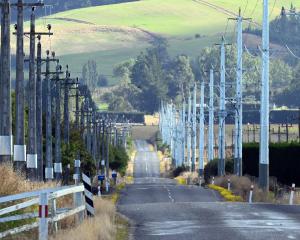Paul Tankard went to mow, went to mow his meadow.
Back in the days when culture grew from the ground up, rather than being imposed on society from above, one of the things people said to each was, that ''a bad workman blames his tools''. I told myself this last Saturday, and knew in my heart of hearts it was true.
Saturday, you may recall, was unseasonably warm for Dunedin in winter, and in the morning one of my Saturday coffee-drinking chums had warned me that it was supposed to be the last fine weather for 10 days.
Bring it on, I thought. If it had rained soon after lunch, I wouldn't have been sorry.
Fine weather imposes certain obligations. Logan Pearsall Smith, a minor American writer who specialised in aphorisms, and who I'm sure never had to mow a lawn in his life, once remarked, ''Thank Heavens the sun has gone in, and I don't have to go outside to enjoy it.'' I could foresee my Saturday afternoon vanishing.
As soon as I'd got the mower out, I realised it was in a number of pieces, and the memory of the last time I'd mowed the grass trickled back. The roller (plastic) had come away from the rest of the mower, and the necessary nut and bolt were untraceably lost in the lawn. At which point, it had been getting dark and cold, and I'd told myself that I'd pretty much finished anyway, and consoled myself with the thought that if God had wanted me to mow the grass, he wouldn't have let the Chinese make lawn mowers.
I had been all the more aggravated, and was now re-aggravated, because I had, years back, envisaged this whole scenario.
Preferring quiet, and wanting to be as little beholden as possible to the oil industry, and just enjoying the physicality of such work, I had always wanted a hand mower.
The hand mower I envisaged was the one my father had and which he had in all likelihood got from his father: with wheels, blades and cogs made of iron, and the shaft, roller and handle made of wood. Great big thick pieces of timber, rubbed smooth with the years. Guessing, accurately, that such a thing would no longer be available in post-industrial New Zealand, I'd scoured the auction houses looking for one.
What I ended up with was a tinny device from one of the hardware supermarkets, made in China, and most of it, apart from the blades, made of plastic. You only need to visit Dunedin's exquisite Chinese Garden to get some idea of how much the Chinese know about lawn mowing. Raking stones, fine - but mowing grass, not a lot.
Years ago I saw a picture of a Chinese peasant in a paddy field, wearing on his head the traditional Chinese sunhat, but on his upper body a T-shirt, bearing, as he was no doubt unaware, the message ''I'm not your bitch''. Every second consumer artefact I bring into the house, apart from produce from the Farmers Market, is made in China, and that image of the man in the field has rather coloured my sense of how much craft and pride in workmanship goes into them.
But last Saturday, the weather was fine, the lawn was less soggy than it had been for a month, and there was no escape.
After the usual bit of banging and cussing that it takes for me to remind myself that the universe in general, and inanimate objects in particular, are not obliged to co-operate with me, I hunted around for an appropriate solution. A nut and a matching bolt of the right dimensions eluded me. There was nothing for it but the No 8-wire solution or at least, the postmodern equivalent: plastic cable ties. Six or seven of these were sufficient to truss up the alleged mower into some semblance of order: and the grass is done.
So, this bad workman, after a slow start, got his lawn mown. Whilst feeling that a better workman may have carried out a more professional-looking repair, or not have bought such a lousy mower in the first place, I was grateful for plastic cable ties, with which any fool can be a mechanic. A bad workman, if he gets the job done, should also credit his tools. Plastic cable ties are, of course, made in China.
- Paul Tankard is a senior lecturer in the English department at the University of Otago.











